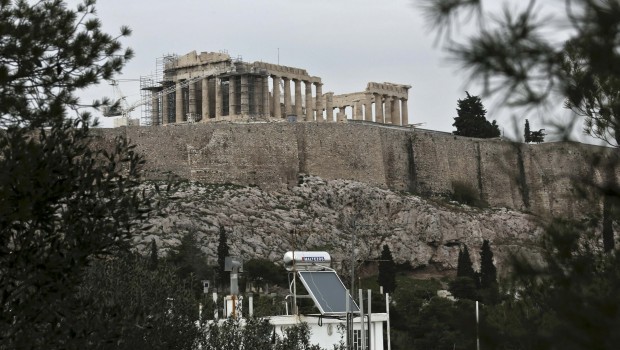
A general view of the Acropolis in Athens, Greece. The Parthenon, which sits atop the Acropolis, was used as a mosque during Ottoman rule and the area around the Acropolis is home to many other Ottoman mosques. (REUTERS/Yorgos Karahalis)
While Athens has many historic mosques constructed during centuries of Ottoman rule, they have been designated as historic sites and thus cannot be used for worship.
The Greek daily newspaper To Vima reported that the allocated funds will be paid in two installments in the second and third quarters of this year. It has been widely reported in the Greek press as the removal of the final real barrier to building a mosque in the Greek capital that meets the requirements of Muslim worship.
There have been proposals to build a modern mosque in Athens since 1890, and the issue has been raised repeatedly since the 1970s, as Athens experienced an influx of Arab immigrants. Several proposals have been considered over the past 40 years, especially as a part of wider disputes between Greece and its predominately Muslim neighbor, Turkey.
The issue came to the fore once again in advance of the 2004 Olympics, and has been reconsidered nearly every year since. A 2011 law provided for the construction of a building “suitable for Islamic worship,” but was subject to a judicial review from the Orthodox bishop of Piraeus, among others, that is still pending. A ruling in favor of construction is expected in the next few weeks, given that the necessary funds have been allocated.
With a proposed capacity of 350, the planned mosque is more a symbolic gesture in a country whose constitution declares that it is “predominately” Greek Orthodox. Athens has a growing Muslim population comprised mainly of immigrants from across the Middle East, Africa and Asia, as well as the Balkans.
Lacking an official prayer space, Muslims often meet to pray in unofficial spaces such as warehouses and basements. These present a hazard in the event of an earthquake or other emergency, as they usually lack sufficient exits. There have been a handful of prosecutions of people repurposing commercial properties as prayer spaces in the Greek capital.
Greece has had a complicated historical relationship with Islam that stems mainly from centuries of Ottoman Turkish rule and ongoing territorial and cultural disputes with Turkey. A deeply conservative, Orthodox Christian society suffering from severe financial difficulties, many in Athens have objected to the government spending public money on the project. Athenians have also raised fears that their culture will be eroded if they promote the culture of non-Christian immigrants, and others worry that Islamic extremism might be promoted at the new mosque.
The Greek Orthodox Church objected to the construction of a mosque in Athens for many years, citing Greece’s historical and national identity as a Christian nation. The Archbishop of Athens gave nominal consent to the construction of a mosque in the capital in 2002, but the Church has since opposed a number of planned mosques based on their distance from Muslim communities, proximity to the airport (where Church leaders feared it might be the first image of the country seen by visitors), and a lack of reciprocity given that Arab Muslim countries have not promised to build Greek Orthodox churches in exchange.
However, Greece has also been protective of Muslim culture in some ways, often motivated by the 1929 Treaty of Lausanne under which Greece and Turkey compulsorily exchanged minority populations. A minority Muslim population was allowed to remain in Western Thrace following the 1929 treaty, and the Greek government fiercely protected a Shari’a family court system administering to Thrace’s Muslims until 2011.
To avoid the Turkish issue, the Greek government has often chosen to negotiate the construction of a mosque with Arab countries; however, recent discussions with Arab leaders have raised fears that any mosque built in conjunction with the Arab states might promote Salafist extremism.
The Greek government has offered several proposed sites for the mosque over the last century, including in an 1890 law allocating land for the construction of an Egyptian mosque and in 1976 as a response to a request from Arab ambassadors to the Greek foreign ministry; however, none of these projects came to fruition due to a combination of planning issues, lack of funding, bureaucratic delays, and objections from local residents and the Greek Orthodox church.
